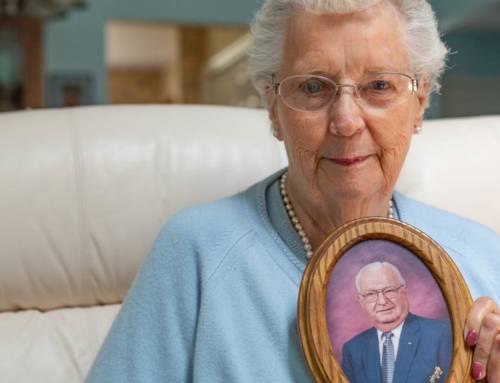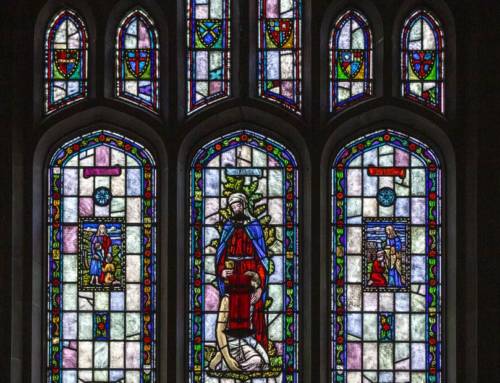
Sunday Sermons from Sell Chapel are written by Rev. Preston Van Deursen, Director of Pastoral Care at the Masonic Village at Elizabethtown.
Funny things happen in church sometimes. Sara Jo Bardsley, a pastor’s wife in Huntington, New York, was telling the children of her first-grade Sunday School class the parable of the seeds. She explained that God said we can plant a seed. If the sun shines on the ground and it rains, or we water it, the seed will grow. However, everything we plant does not grow, because sometimes the seed blows over the fence and falls among weeds. If we do not take care of it, it dies.
Then she explained that people are often like this. God creates us to be good, and if we live good lives and love God and help others, we can grow into a beautiful person. But if we get lost or fail to follow God’s teachings, we can be like the seeds that never grow.
Six-year-old Mark understood this very well. He announced loud enough for the whole church to hear: “My father! He’s over the fence all right. He never comes to church, he doesn’t read the Bible, and he never helps anybody.”
I would like to have heard the conversation in Mark’s car going home that morning. Some funny things happen in church.
Often they are inadvertent. SOMEONE spotted a “typo” in the church bulletin. It read like this: “The ushers will eat the latecomers.” That is one church where you want to be on time.
Some funny things happen in church. Also, of course, some tragic things occur in church. We are not all God created us to be. Someone once compared his church to Noah’s Ark. “If the flood on the outside were not so bad, you couldn’t stand the smell on the inside.”
That can happen in the church. We are, after all, only human.
In John’s Gospel Jesus prays for the church. He prays that we will all be one. Considering the present fragmentation of the Christian community, Christ is probably still praying that prayer today.
What is it that holds together the body of Jesus Christ? What is the source of our unity?
Every week here at Sell we say these familiar words
I believe in the Holy Catholic Church… the communion of saints
I remember when we changed the words from the holy Christian church
to some of us it still feels funny. To this day, some still won’t say it. Others mumble it. And many wonder why we do it.
In the creed, of course, the word “catholic” is not capitalized. Meaning that it is not part of the proper name “Roman Catholic.” Rather, it is an adjective (drawn from the Greek word katholikos) meaning “general” or “universal.” When Paul reminded his Corinthian readers (I Cor. 1:1-9) that they were called to be saints together with all those who, in every place, call upon the name of the Lord, he was describing the catholicity of the church…..its universality….its inclusivity….its amazing breadth and its global reach.
John Wesley once preached a famous sermon entitled “The Catholic Spirit,” but in it cannot be found any word of things Roman. In fact, the word “catholic” (small “c”) appeared when the creed appeared in 390 A.D. in France. While the name “Roman Catholic” (large “C”) was never formally applied to the Church of Rome until sometime in the 15th century (about the time of the Protestant Reformation).
In scrolling through over 700 references on the internet to the phrase “I believe in the holy catholic church,” I found one Methodist sermon so titled. It was preached this year, no less, in Dover, New Hampshire by Anne Robertson. Ann’s most interesting paragraph reads:
On its most basic level, saying you believe in “the holy catholic church” means that you can’t automatically designate the members of some other church or denomination as going to hell. I’ve said before that we really can’t do that to anybody. It’s not our decision. But this sentence acknowledges that we believe all other Christian churches are, at a fundamental level, of the same faith as we are. So if you have a strong hatred for some other church or denomination, this line in the creed says that Christianity doesn’t teach such a prejudice. In a very real sense, we are affirming the Roman Catholic Church, the Greek Orthodox Church, along with the Baptists, Presbyterians, Pentecostals, Congregationalists, and any other church founded on faith in Jesus Christ. We are saying that we are “catholic”….one church….connected.
Which echoes Paul’s oft-quoted line about the church, suggesting that one will find (in it) “neither Jew nor Greek, circumcised or uncircumcised, barbarian, Scythian, slave nor free….but Christ in all” (Col. 3:11). Which calls to mind Jesus’ prayer in the Garden of Gethsemane that “they (meaning his followers) might all be one” (John 17:20).
Paul tells the Ephesians to “forebear one another in love” (which is pretty much the only way some of us can forebear others of us….thankful that while we are called to love each other, no one said we necessarily had to like each other). “Forebear one another in love, being eager (interesting word, ‘eager’) to maintain the unity of the spirit.” Which is not a new challenge held out solely to Christians, given that Psalm 133 extends a similar challenge to Jews:
How good and pleasant it is when brothers (and presumably, sisters) dwell together in unity. It is like precious oil running through the beard, or dew quietly settling over the mountains.
Which is a lovely sentiment, even though I can’t quite get “into” the idea of oil running through my beard. But what everybody seems to be suggesting is that unity is an ideal state….albeit an elusive one. Over time, the issues change….as do the combatants. If you look around today, the “separation of the house” no longer runs along the Protestant/Catholic fault line, but through the hearts of denominations and even individual congregations. It was thirty years ago when I first heard myself say: “Strange as it seems, I sometimes feel a greater kinship with Catholic priests who look at things the way I look at things, than I feel with Protestant clergy who don’t.”
Today, there are people in large ecclesiastical bodies….like our own (and the Presbyterians and Episcopalians….who literally salivate over the idea of taking their entire denomination to divorce court. The only thing slowing such action being the issue of who gets to keep the buildings. I have seen Christians split the family over everything from baptisms to bylaws. But recent (repeated) skirmishes seem to center on the issues of what sinners can eat at the table….what couples can come to the altar….and what genders can preach in the pulpit. And there are always those buzzwords that spike blood pressures….like “spirit-filled” (I’ve yet to see a church that totally was) and “Bible believing” (I’ve yet to see a church that totally wasn’t).
John Buchanan of Fourth Presbyterian….that church on the Miracle Mile in the Windy City that everyone loves to visit (in part, because John Buchanan preaches sermons everyone loves to hear)….writes in The Christian Century:
There are some of us who still place a premium on the unity of the church, even though there hasn’t been a day in the past ten years I haven’t wished I belonged to a church that wasn’t fighting and arguing. But I stay with it….just as many thousands like me stay with their ecclesiastical families….because we believe our Lord wants us to. And we believe our Lord was serious when he prayed for the oneness of his disciples so that the world may believe.
OBVIOUSLY WE ARE UNITED, FIRST OF ALL, BY OUR BELIEFS. I say that knowing that churches are just as apt to be torn apart by what they believe. Particularly in our land there is a great affinity among Christians for breaking into rival camps. Maybe that is not totally bad. At least where people are arguing, beliefs are important.
John R. Claypool tells a delightful story that he picked up in Texas about a certain Mexican bank robber by the name of Jorge Rodriguez, who operated along the Texas border around the turn of the century. He was so successful in his forays that the Texas Rangers put a whole extra posse along the Rio Grande to try and stop him. Sure enough, late one afternoon, one of these special Rangers saw Jorge stealthily slipping across the river, and trailed him at a discreet distance as he returned to his home village. He watched as Jorge mingled with the people in the square around the town well and then went into his favorite cantina to relax. The Ranger slipped in and managed to get the drop on Jorge. With a pistol to his head he said, “I know who you are, Jorge Rodriguez, and I have come to get back all the money that you have stolen from the banks in Texas. Unless you give it to me, I am going to blow your brains out.” There was one fatal difficulty, however, Jorge did not speak English and the Texas Ranger was not versed in Spanish. There they were, two adults at an utter verbal impasse.
But about that time an enterprising little Mexican came up and said, “I am bilingual. Do you want me to act as translator?” The Ranger nodded, and he proceeded to put the words of the Ranger into terms that Jorge could understand. Nervously, Jorge answered back: “Tell the big Texas Ranger that I have not spent a cent of the money. If he will go to the town well, face north, count down five stones, he will find a loose one there. Pull it out and all the money is behind there. Please tell him quickly.” The little translator got a solemn look on his face and said to the Ranger in perfect English, “Jorge Rodriguez is a brave man. He says he is ready to die.”
It is absurd to say that what you do not know won’t hurt you. Tell that to Jorge Rodriguez. It is equally absurd to say that it doesn’t matter what you believe, as long as you are sincere. Of course it matters what you believe.
On Lakemba, one of the Fiji Islands, if you visit the Centenary Church, you will find a white chapel with a thatched roof. It is in the shape of a cross. Several hundred people worship there at all services.
All the furniture is white wood, except for the baptismal font. It is a light gray coral stone about three feet high, with a place hollowed out for the water.
When the first missionary arrived in 1835, the islanders worshipped a god of harvest, to whom an annual sacrifice had to be offered to insure good crops. Usually a small young boy was chosen.
On a killing stone, the little head was crushed with a rock, so that the victim’s blood would flow down and cover the whole stone. Then the god would give a good and plentiful harvest.
The old killing stone where life was taken has now become the baptismal font, where new life begins for those who are baptized in the name of the Father, the Son, and the Holy Spirit.
How absurd to say that it doesn’t matter what you believe. Of course it matters. Sometimes it matters so much that churches divide. That’s sad. But when the dust settles, no matter how uncomfortable it makes us, there is a common bond that unites everyone who takes upon himself or herself the name Christian. That bond is this: We believe that God so loved the world that He gave His own Son that whoever believes in him shall have life everlasting. We believe that and that unites us with millions of believers around this planet.
LIKEWISE, WE need to be UNITED BY WHO WE SERVE. We NEED TO BE united by what we believe, first of all. AND we need to be united by who we serve. We serve Christ. He is the inspiration of our lives. He is the living presence who works within us. He is the Lord and Master of all we are and hope to be.
Somewhere I read about a magazine advertisement for a humane society in which there is a photograph of a dog and a cat sitting side by side in uncustomary harmony. The caption over their heads is, “A Couple of VIP’sVery Important Pets.” And in the fine print underneath, the next line adds, “What makes them important is who owns them.”
If you and I are VIP’s, it’s only for one reason-who owns us. We are His. It is in His steps that we walk.
Peter Drucker, America’s management guru, tells of a hospital administrator who held his first staff meeting. They worked through a rather difficult matter and the new boss felt the matter was settled. But then suddenly one of the staff asked, “Would this have satisfied Nurse Bryan?” The arguments immediately started all over again and did not stop until a better solution to the problem had been hammered out.
Who was this Nurse Bryan? The administrator soon found out. She had been a long serving nurse in the hospital. Whenever a decision regarding patient care came up, Nurse Bryan would ask, “Are we doing the best we can to help this patient?” As a result of her conscientious concern, patients on her floor did better and recovered faster. Gradually as time went by, the whole hospital learned to adopt what became known as “Nurse Bryan’s Rule.”
Though she had retired ten years earlier, the standard she had set was still providing vision for employees in the hospital today. Her secret? She took every aspect of hospital work back to the central question: “What can we do to best do our job as a hospital?”
St. Paul set the standard for us over 1900 years ago when he wrote that our job is “whether at home or absent, to be pleasing to Him.” (II Corinthians 5:9). That is our test of excellence in the church and in our lives as believers in Him. Would this be pleasing to Jesus?
We are united by what we believe. We are united by whom we serve. FINALLY WE ARE UNITED BY THOSE WHOM WE ARE TRYING TO SAVETHE WORLD FOR WHICH CHRIST DIED. The church can never be satisfied with protecting its own existence. We serve One who poured out his life for the world. That is our calling as well.
Who is it that you are offering shelter to? To whom are you reaching out arms of love and mercy? I ask the same question of myself. We have no other purpose as the church of Jesus Christ.
United by what we believe. We believe in Jesus Christ as our personal Savior and Lord. United by whom we serve. We seek to serve Him in all we think, say and do. United by whom we are seeking to save. The world for which Christ died.




